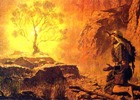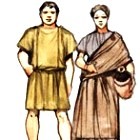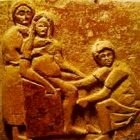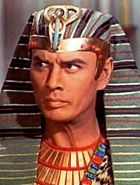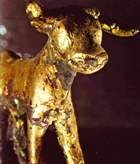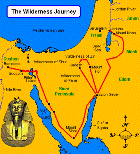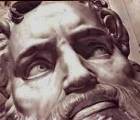Moses & the 10 Plagues
This story is about God’s power – over earthly rulers
no matter how powerful, and over Nature itself.
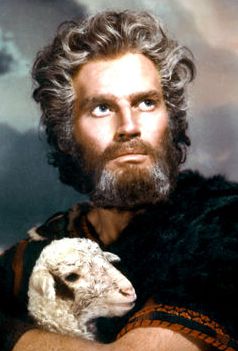 It also describes one of God’s strange habits: using an unworthy person (Moses, who is an inept speaker and a reluctant instrument of God) to change the course of human destiny – in this case to confront the most powerful ruler in the world and out-manoeuvre him, and lead a disorganised rabble of slaves into a new life and a new land.
It also describes one of God’s strange habits: using an unworthy person (Moses, who is an inept speaker and a reluctant instrument of God) to change the course of human destiny – in this case to confront the most powerful ruler in the world and out-manoeuvre him, and lead a disorganised rabble of slaves into a new life and a new land.
The story of Moses has 6 episodes:
- 1. The baby Moses is cast adrift in the waters of the Nile: Exodus 2:1-10
- 2. The Burning Bush, God tells Moses to save the Hebrews: Exodus 2:23-4
- Moses and Pharaoh, ‘Let My People Go’, the Ten Plagues: Exodus 5-12
- Wandering in the Desert, Crossing the Red Sea: Exodus 13-18
- The Ten Commandments: Exodus 20
- The Golden Calf: Exodus 32
Moses’ world
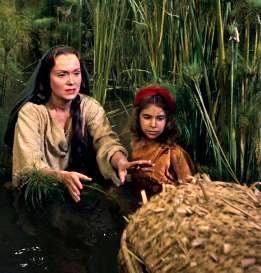 Moses, a Hebrew baby rescued from certain death in the Nile River, was adopted/protected by the Egyptian royal household. When he eventually learned of his origins he began to take an interest in his kin.
Moses, a Hebrew baby rescued from certain death in the Nile River, was adopted/protected by the Egyptian royal household. When he eventually learned of his origins he began to take an interest in his kin.
He had been born into a group of people who worked as slave labourers for the Egyptians.
One of their main tasks was brick-making — almost all ordinary buildings throughout Egypt were made of mud bricks.
Perhaps because of the ritual cleanliness laws which meant their babies survived and their people were healthy, the Hebrew population had grown so much that the native Egyptians, especially Pharaoh, began to fear them.
As a result, they were probably treated worse than the native Egyptian workers, but they had strong family loyalties and little affection for their Egyptian overlords, and this unified them.
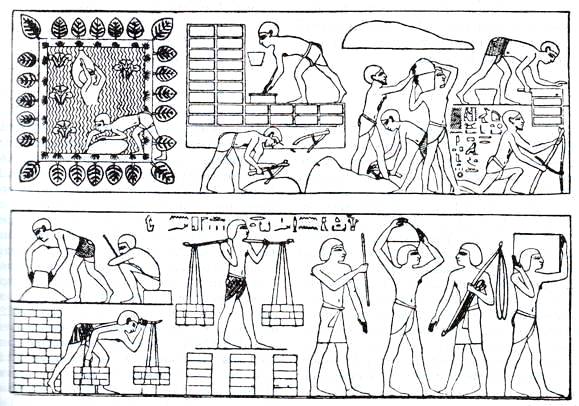
The laborious process of brick-making in ancient Egypt. This wall painting from the tomb of Rekhmara shows the process of making bricks in the 15th century BC.
One day Moses saw an Egyptian maltreating a Hebrew worker. In a fit of rage he killed the Egyptian, and had to flee Egypt.
He found refuge in the territory of Midian where he became a shepherd for Jethro, a priest. He married Jethro’s daughter Zipporah and had two sons.
Moses returns to Egypt
Then he had an extraordinary encounter with God who spoke to a reluctant Moses, appearing to him in the form of a Burning Bush. God commanded Moses to return to Egypt, confront Pharaoh, and lead the Hebrews to freedom.
Moses did not want to do this. How could he, a relative nobody, do such a thing? God reassured him. God would be at his side and give him the necessary courage and skills to carry out this task.
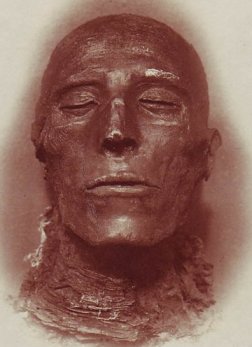
The mummified face of Seti I, photograph by Emil Brugsch
Reluctant and resolute at the same time, Moses returned to Egypt and, helped by his older brother Aaron, he confronted Pharaoh (one wonders how he gained access to the royal presence: what is the story behind that?).
The photograph at right shows the mummified face of Seti I, whom many scholars believe to be the Pharaoh described in the story of Moses.
Moses asked Pharaoh to let the Hebrews go. Naturally, Pharaoh declined.
The Ten Plagues
As a sign that they were backed up by an all-powerful God, Moses and Aaron engaged in a sort of contest with the court magicians/priests. They performed a variety of miraculous feats designed to show the superiority of one type of magic (theirs) over another (the Egyptian priests’).
They performed a variety of miraculous feats designed to show the superiority of one type of magic (theirs) over another (the Egyptian priests’).
The climax of the contest came when the priests and Aaron both turned their wooden staffs into snakes – but Aaron’s snake/staff devoured the snakes/staffs of the priests.
The Egyptian priests were defeated, a prefiguration of the contest that would develop between Pharaoh and God which God, of course, would win.
In spite of the defeat of his priests, Pharaoh continued to refuse the demand for freedom. The Israelites had to stay in Egypt – and what is more, they had to work harder.
In response, God afflicted Egypt with the Ten Plagues:
- the River Nile turned to blood

- frogs overran the country
- lice and mosquitoes tormented the people
- flies swarmed everywhere
- livestock became diseased
- boils erupted on people’s bodies
- thunder and hail rained down
- locusts ate the crops
- darkness fell in day-time
- all the firstborn sons of Egyptians died
The Plagues were not punishments, but a demonstration of God’s power. Moses, under God’s guidance, predicted each one, and his predictions were fulfilled each time. This made it appear to the Egyptians that his magic was stronger than theirs and that he could command the support of a more powerful god than they had.
The First Passover
Under the weight of these afflictions, Pharaoh was finally moved to allow the Israelites and their families to go, but he insisted that they leave their animals behind. This was clearly impossible, since they depended on their flocks for food on the journey.
When Pharaoh still refused Moses’ (and God’s) command, Moses proclaimed the death of the first-born of all Egypt.
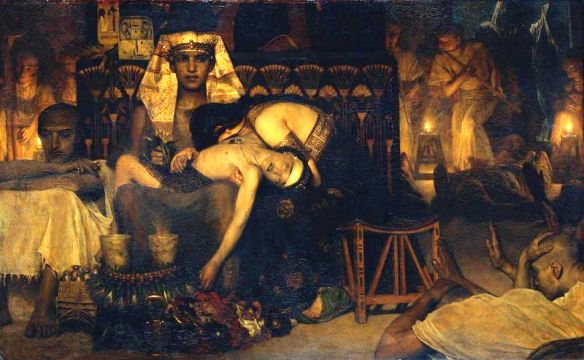
Death of the Pharaoh’s Firstborn Son, Lawrence Alma Tadema
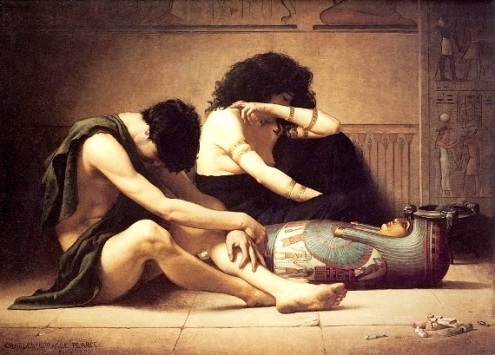
Death of the Egyptian firstborn, Charles Pearce
The Hebrews were spared when they daubed the blood of a sacrificed lamb on their door jambs. They ate a hasty meal, the first Passover, gathered up their few belongings, and prepared to leave. This time, Pharaoh consented to the Hebrews’ departure, and they set out on what was to be a very long journey.
Moses’ story in brief
God told Moses to free the Hebrew people and lead them out of Egypt, to the Promised Land. Moses hesitated at first but then, almost despite himself, took on the task and succeeded.
It did not happen without a struggle. Pharaoh did not want to let his labor force to leave the country. Moses was forced to inflict a series of plagues on Egypt before Pharaoh agreed to relinquish his hold. The last plague was the worst: the death of every firstborn Egyptian. Only then could the Hebrews, led by Moses, escape from Egypt.
______________________________________________
Bible Study Activities
Topics for Discussion or Meditation
1. The Journey
 Trite but true: life is a journey, and we are all at different places on the road.
Trite but true: life is a journey, and we are all at different places on the road.
Think about your own life, with happy and sad times as hills and valleys. What has been the landscape of your life? Too many valleys and not enough hills? A rather flat plain? Visualize your life as a landscape. How do you see it? What is there in front of you? Behind you? A road not taken?
2. Believe in Yourself
 Moses felt inadequate to the task ahead. Perhaps he saw his own failings too clearly, and let his doubts blot out his potential. Only when God persisted did Moses give in, accepting God’s commission to free the Hebrews and lead them out of Egypt – even though he was reluctant to do so.
Moses felt inadequate to the task ahead. Perhaps he saw his own failings too clearly, and let his doubts blot out his potential. Only when God persisted did Moses give in, accepting God’s commission to free the Hebrews and lead them out of Egypt – even though he was reluctant to do so.
- Do you over-emphasise your failings?
- Do you let your lack of confidence shape your life, stopping you doing things you might be capable of?
- What are the best things you have achieved?
- Forget about modesty for the moment: make a good long list of the good things about yourself. Then thank God for being what you are!
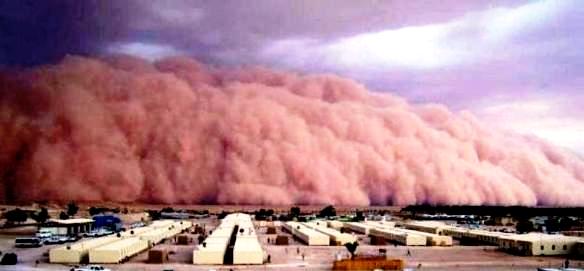
Duststorm in the Middle East – the darkness that came over the land?
Links: Moses
© Copyright 2006
Elizabeth Fletcher

